Jesus and the Gospels Lesson 7
Luke-Acts II
Mike Ervin
Jesus and the Gospels Luke-Acts II
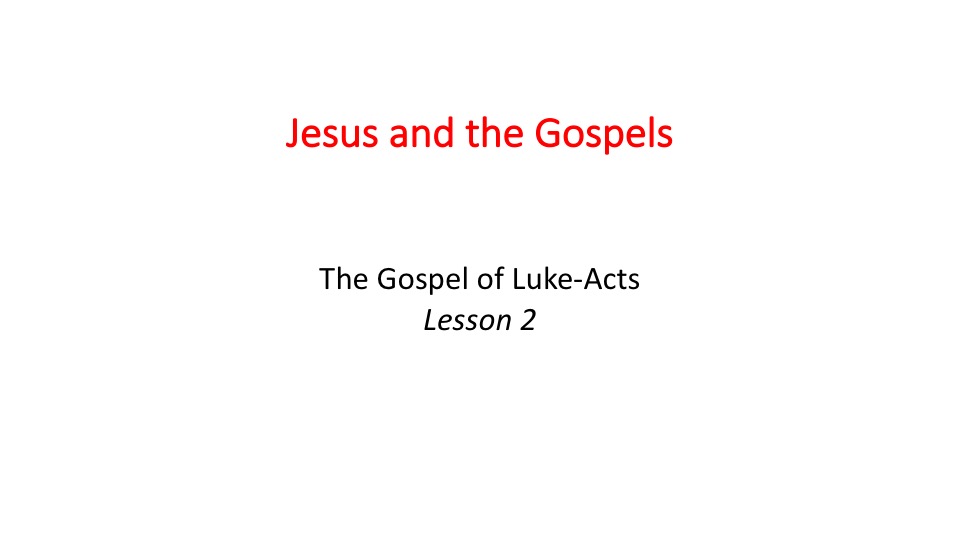
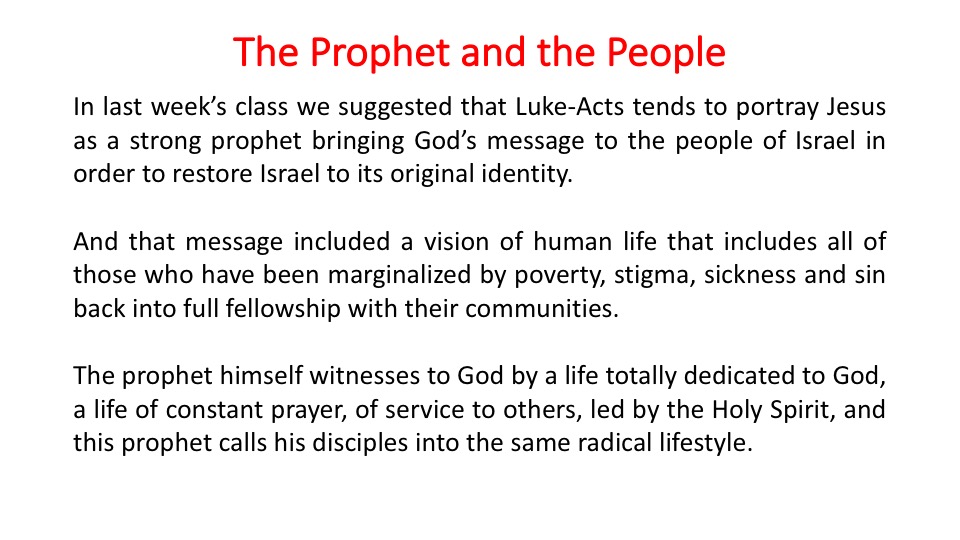
The Prophet and the People
In last week’s class we suggested that Luke-Acts tends to portray Jesus as a strong prophet bringing God’s message to the people of Israel in order to restore Israel to its original identity.
And that message included a vision of human life that includes all of those who have been marginalized by poverty, stigma, sickness and sin back into full fellowship with their communities.
The prophet himself witnesses to God by a life totally dedicated to God, a life of constant prayer, of service to others, led by the Holy Spirit, and this prophet calls his disciples into the same radical lifestyle.
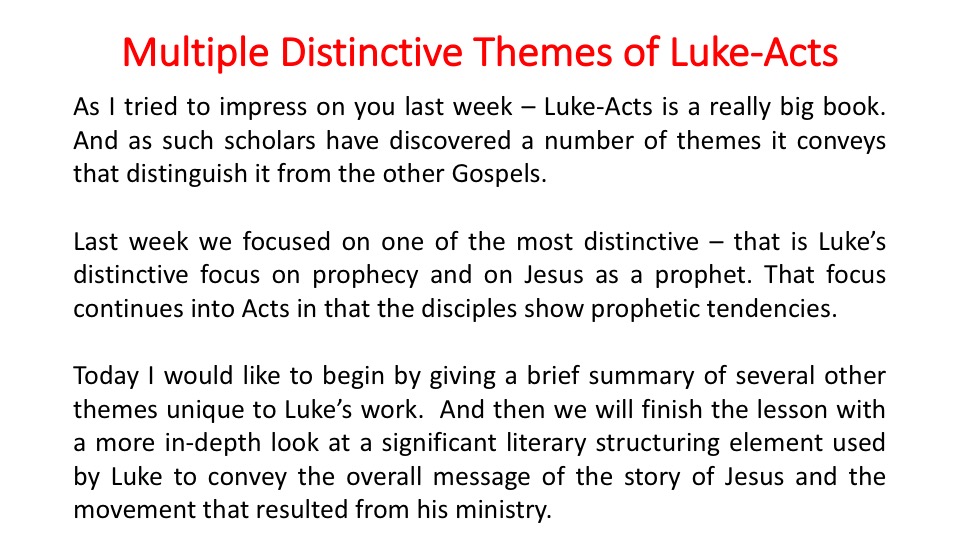
Multiple Distinctive Themes of Luke-Acts
As I tried to impress on you last week – Luke-Acts is a really big book. And as such scholars have discovered a number of themes it conveys that distinguish it from the other Gospels.
Last week we focused on one of the most distinctive – that is Luke’s distinctive focus on prophecy and on Jesus as a prophet. That focus continues into Acts in that the disciples show prophetic tendencies.
Today I would like to begin by giving a brief summary of several other themes unique to Luke’s work. And then we will finish the lesson with a more in-depth look at a significant literary structuring element used by Luke to convey the overall message of the story of Jesus and the movement that resulted from his ministry.
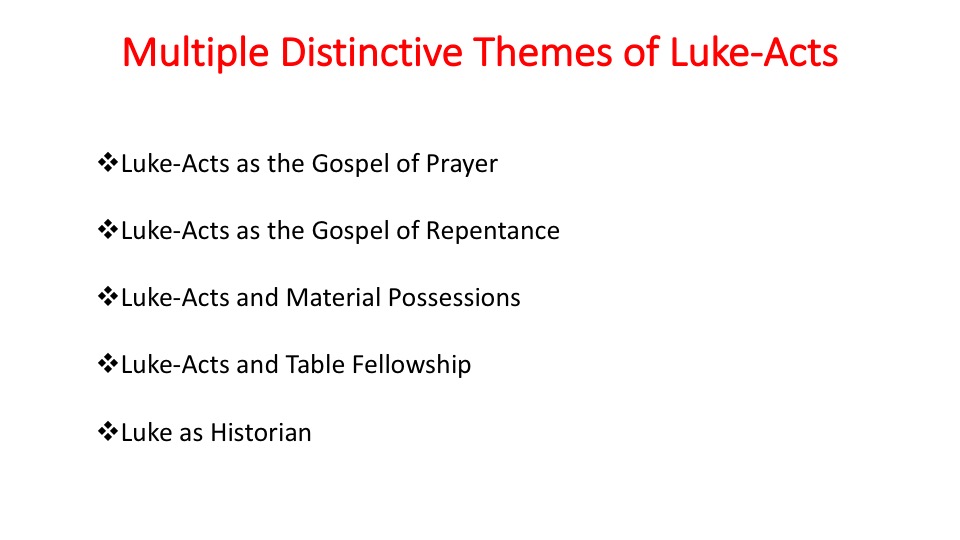
Jesus and the Gospels
Multiple Distinctive Themes of Luke-Acts
Luke-Acts as the Gospel of Prayer
Luke-Acts as the Gospel of Repentance
Luke-Acts and Material Possessions
Luke-Acts and Table Fellowship
Luke as Historian
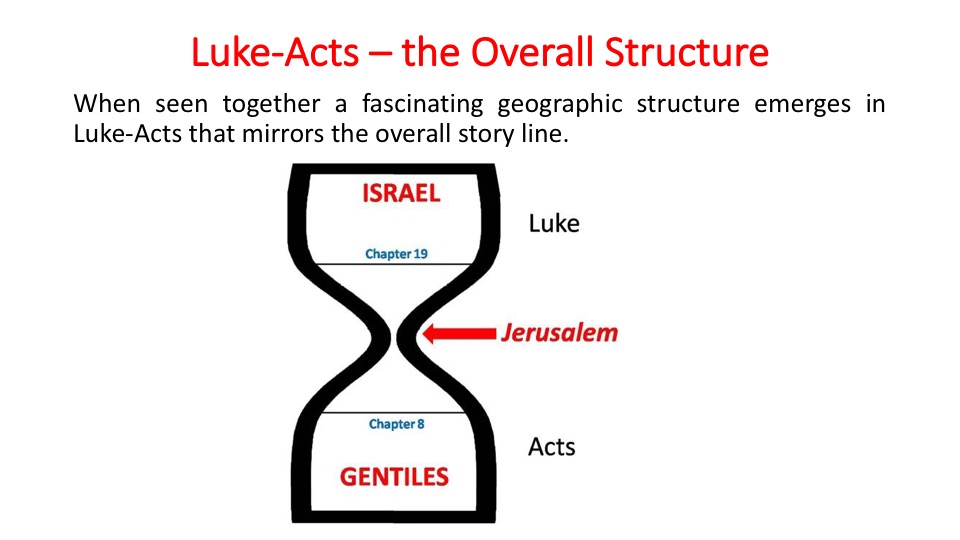
Luke-Acts – the Overall Structure
When seen together a fascinating geographic structure emerges in Luke-Acts that mirrors the overall story line.

Jesus and the Gospels
Luke-Acts and Geography
Luke-Acts is a strongly Jerusalem-centered narrative. The twelve central chapters of the combined work sit right there in Jerusalem. Jesus arrives at Jerusalem with the triumphal entry in Luke 19 and the story doesn’t leave Jerusalem till after the stoning of Stephen in Acts 7.
In all the other Gospels there are resurrection appearances in Galilee.
In Luke the risen Jesus ventures no further than Bethany (Luke 24:50) and Emmaus (Luke 24:13-35), both Judean villages in close proximity to Jerusalem.
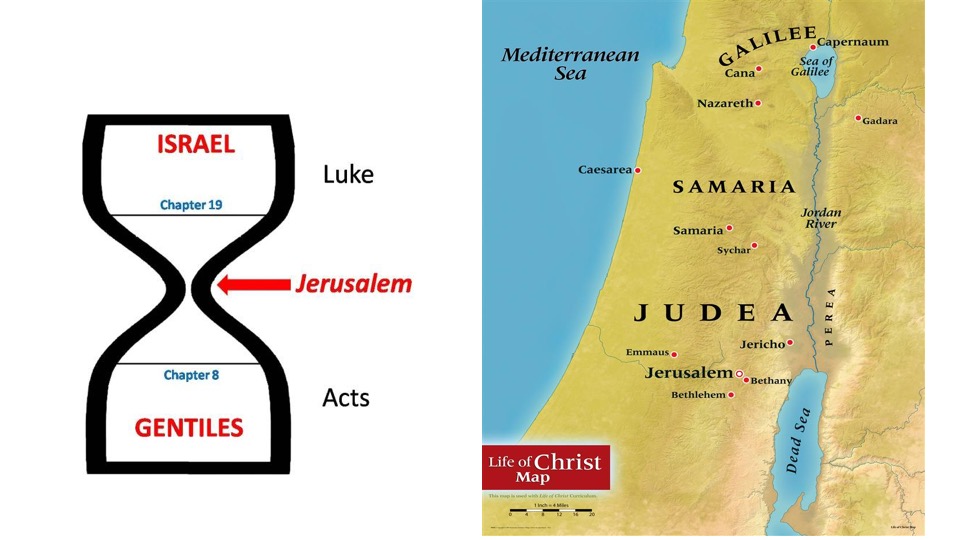
Let's look at a map of Israel. Important to note that both the area labeled Judea and the area labeled Galilee were considered Jewish, both ethnically and religiously. Not so for Samaria, where the inhabitants were not considered true Jews because of intermarriage with Gentiles. In Luke Jesus's home was in Nazareth. And his ministry in the early part of Luke was in and around Galilee. Chapter 19 in Luke covered Jesus's entry into Jerusalem.
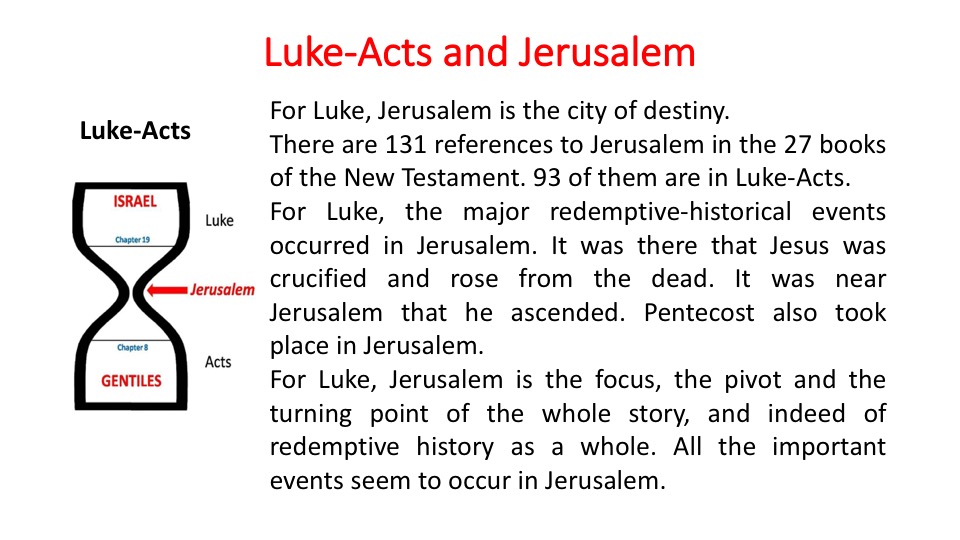
Luke-Acts and Jerusalem
For Luke, Jerusalem is the city of destiny.
There are 131 references to Jerusalem in the 27 books of the New Testament. 93 of them are in Luke-Acts.
For Luke, the major redemptive-historical events occurred in Jerusalem. It was there that Jesus was crucified and rose from the dead. It was near Jerusalem that he ascended.
Pentecost also took place in Jerusalem. For Luke, Jerusalem is the focus, the pivot and the turning point of the whole story, and indeed of redemptive history as a whole. All the important events seem to occur in Jerusalem.
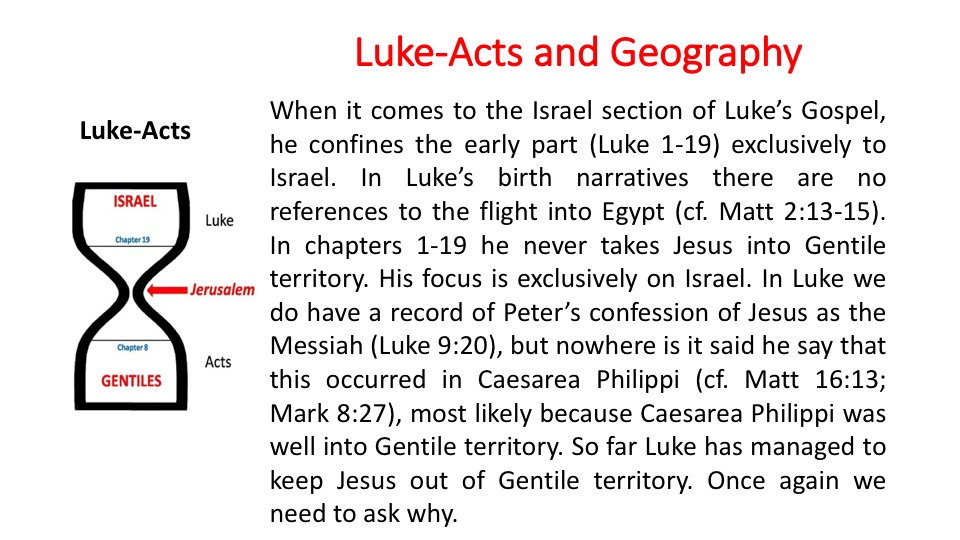
Luke-Acts and Geography
When it comes to the Israel section of Luke’s Gospel, we find that Luke is again unique among the Synoptics. Just as he confines the center of his two- volume narrative to Jerusalem, he confines the early part (Luke 1-19) exclusively to Israel. In Luke’s birth narratives there are no references to the flight into Egypt (cf. Matt 2:13-15). In Luke there is no mention of the Syrophoenician woman whose daughter Jesus heals in the area of Tyre and Sidon (cf. Matt 15:21-28; Mark 7:24-30). In chapters 1-19 he never takes Jesus into Gentile territory. His focus is exclusively on Israel. In Luke we do have a record of Peter’s confession of Jesus as the Messiah (Luke 9:20), but nowhere is it said he say that this occurred in Caesarea Philippi (cf. Matt 16:13; Mark 8:27), most likely because Caesarea Philippi was well into Gentile territory. So far Luke has managed to keep Jesus out of Gentile territory. Once again we need to ask why.
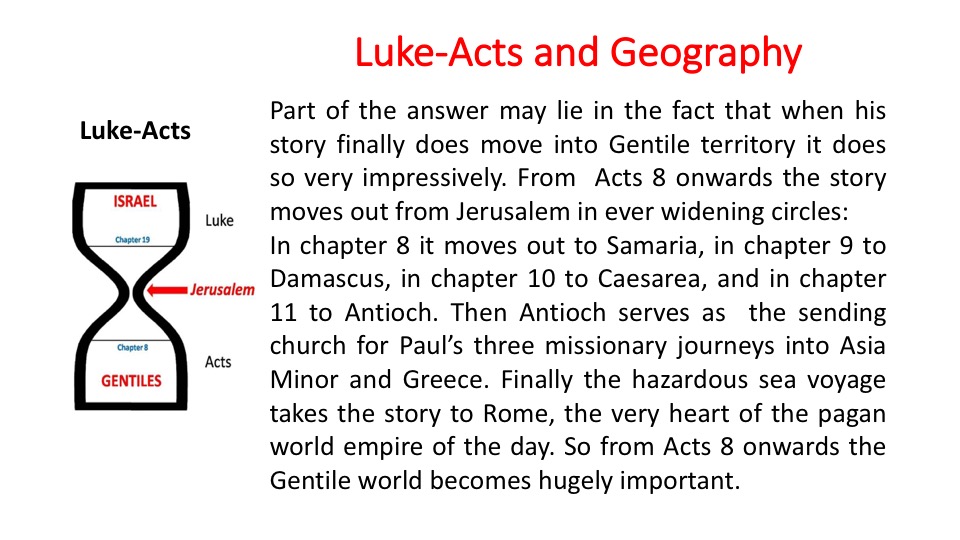
Luke-Acts and Geography
Part of the answer may lie in the fact that when his story finally does move into Gentile territory it does so very impressively. From Acts 8 onwards the story moves out from Jerusalem in ever widening circles:
In chapter 8 it moves out to Samaria, in chapter 9 to Damascus, in chapter 10 to Caesarea, and in chapter 11 to Antioch. Then Antioch serves as the sending church for Paul’s three missionary journeys into Asia Minor and Greece. Finally the hazardous sea voyage takes the story to Rome, the very heart of the pagan world empire of the day. So from Acts 8 onwards the Gentile world becomes hugely important.
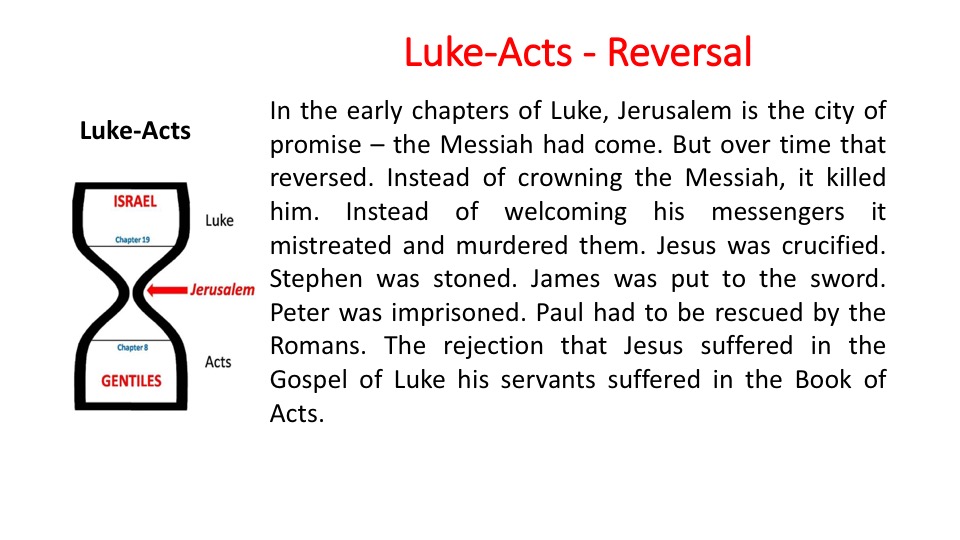
Luke-Acts and Geography
A Reversal of Expectations
In the early chapters of Luke, Jerusalem is the city of promise – the Messiah had come. But over time that reversed. Instead of crowning the Messiah, it killed him. Instead of welcoming his messengers it mistreated and murdered them. Jesus was crucified. Stephen was stoned. James was put to the sword. Peter was imprisoned. Paul had to be rescued by the Romans. The rejection that Jesus suffered in the Gospel of Luke his servants suffered in the Book of Acts.
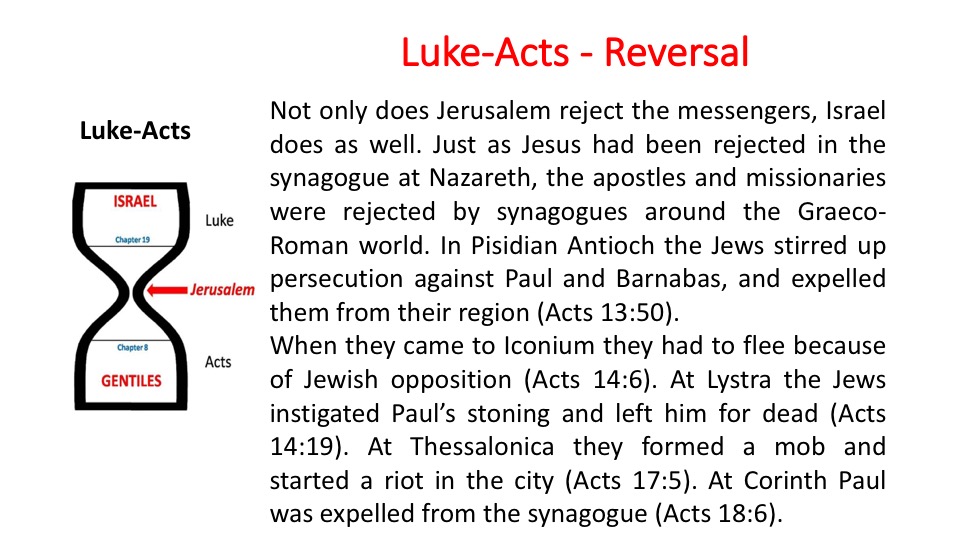
Luke-Acts and Geography
A Reversal of Expectations
Acts takes the matter even further. Not only does Jerusalem reject the messengers, Israel does as well. Just as Jesus had been rejected in the synagogue at Nazareth, the apostles and missionaries were rejected by synagogues around the Graeco-Roman world. In Pisidian Antioch the Jews stirred up persecution against Paul and Barnabas, and expelled them from their region (Acts 13:50
When they came to Iconium they had to flee because of Jewish opposition (Acts 14:6). At Lystra the Jews instigated Paul‟s stoning and left him for dead (Acts 14:19). At Thessalonica they formed a mob and started a riot in the city (Acts 17:5). At Corinth Paul was expelled from the synagogue (Acts 18:6).
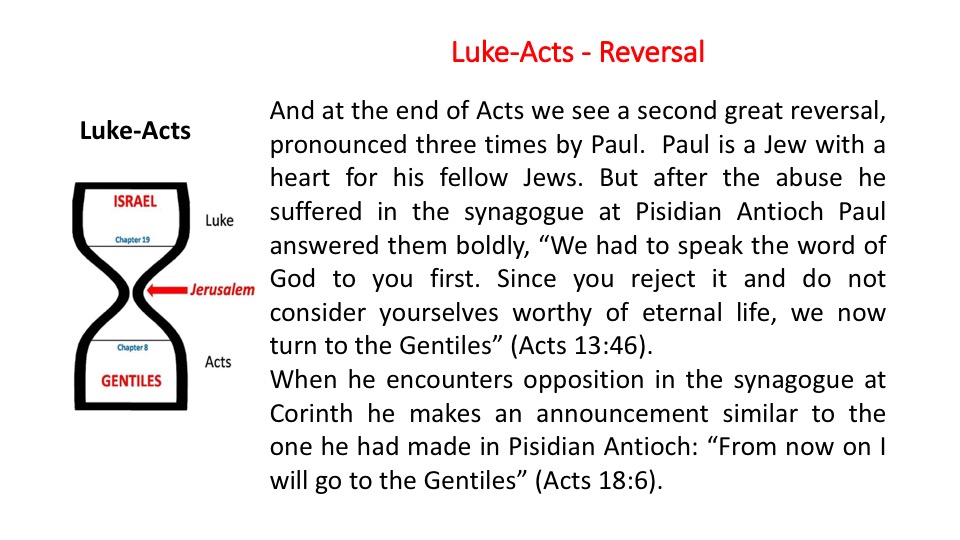
Luke-Acts and Geography-Reversal
And at the end of Acts we see a second great reversal, pronounced three times by Paul. Paul is a Jew with a heart for his fellow Jews. But after the abuse he suffered in the synagogue at Pisidian Antioch Paul answered them boldly, “We had to speak the word of God to you first. Since you reject it and do not consider yourselves worthy of eternal life, we now turn to the Gentiles” (Acts 13:46).
When he encounters opposition in the synagogue at Corinth he makes an announcement similar to the one he had made in Pisidian Antioch: “From now on I will go to the Gentiles” (Acts 18:6).
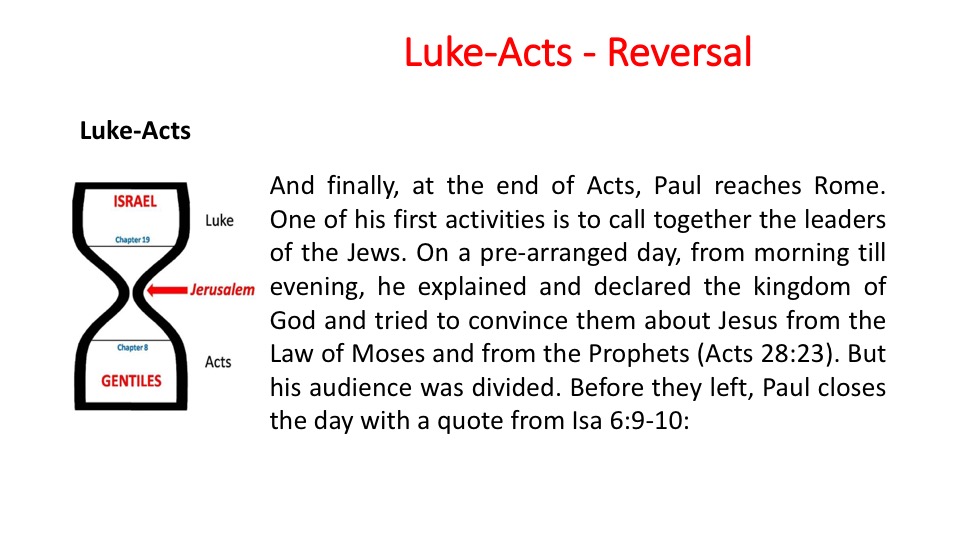
Luke-Acts and Geography-Reversal
And finally, at the end of Acts, Paul reaches Rome. One of his first activities is to call together the leaders of the Jews. On a pre-arranged day, from morning till evening, he explained and declared the kingdom of God and tried to convince them about Jesus from the Law of Moses and from the Prophets (Acts 28:23). But his audience was divided. Before they left, Paul closes the day with a quote from Isa 6:9-10:
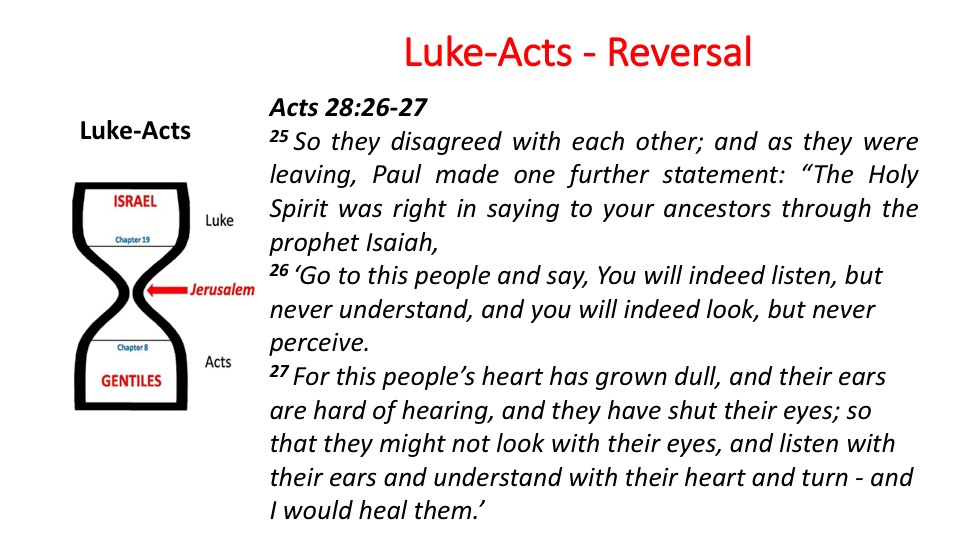
Luke-Acts – Reversal
Acts 28:26-27
25 So they disagreed with each other; and as they were leaving, Paul made one further statement: “The Holy Spirit was right in saying to your ancestors through the prophet Isaiah, 26 ‘Go to this people and say, You will indeed listen, but never understand, and you will indeed look, but never perceive.
27 For this people’s heart has grown dull, and their ears are hard of hearing, and they have shut their eyes; so that they might not look with their eyes, and listen with their ears and understand with their heart and turn - and I would heal them.’
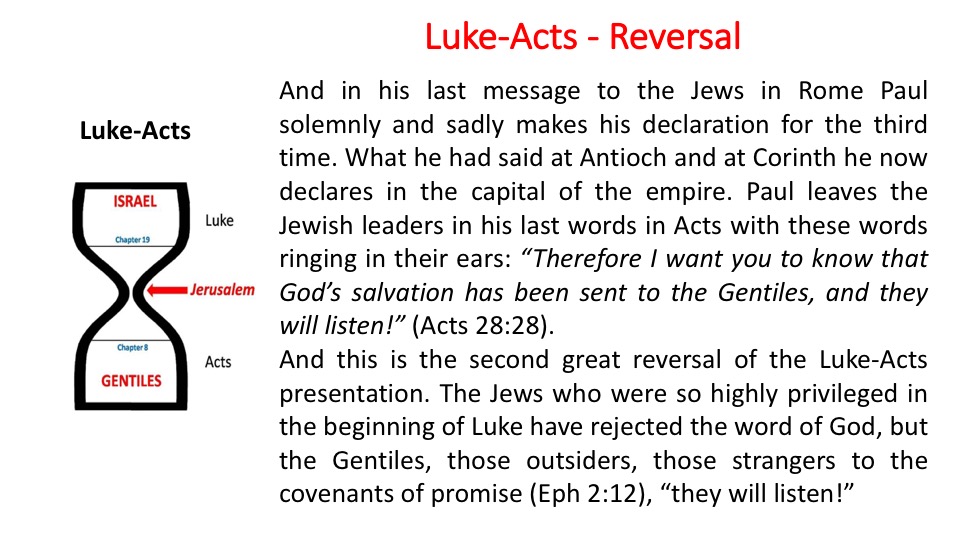
Luke-Acts and Geography-Reversal
And in his last message to the Jews in Rome Paul solemnly and sadly makes his declaration for the third time. What he had said at Antioch and at Corinth he now declares in the capital of the empire. Paul leaves the Jewish leaders in his last words in Acts with these words ringing in their ears: “Therefore I want you to know that God’s salvation has been sent to the Gentiles, and they will listen!” (Acts 28:28).
And this is the second great reversal of the Luke-Acts presentation. The Jews who were so highly privileged in the beginning of Luke have rejected the word of God, but the Gentiles, those outsiders, those strangers to the covenants of promise (Eph 2:12), “they will listen!”
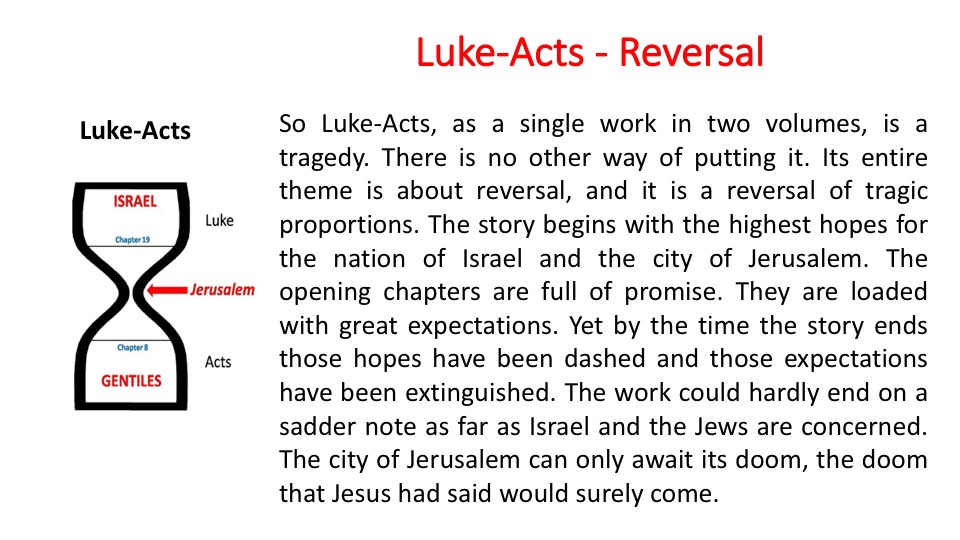
Luke-Acts and Geography-Reversal
So Luke-Acts, as a single work in two volumes, is a tragedy. There is no other way of putting it. Its entire theme is about reversal, and it is a reversal of tragic proportions. The story begins with the highest hopes for the nation of Israel and the city of Jerusalem. The opening chapters are full of promise. They are loaded with great expectations. Yet by the time the story ends those hopes have been dashed and those expectations have been extinguished. The work could hardly end on a sadder note as far as Israel and the Jews are concerned. The city of Jerusalem can only await its doom, the doom that Jesus had said would surely come.
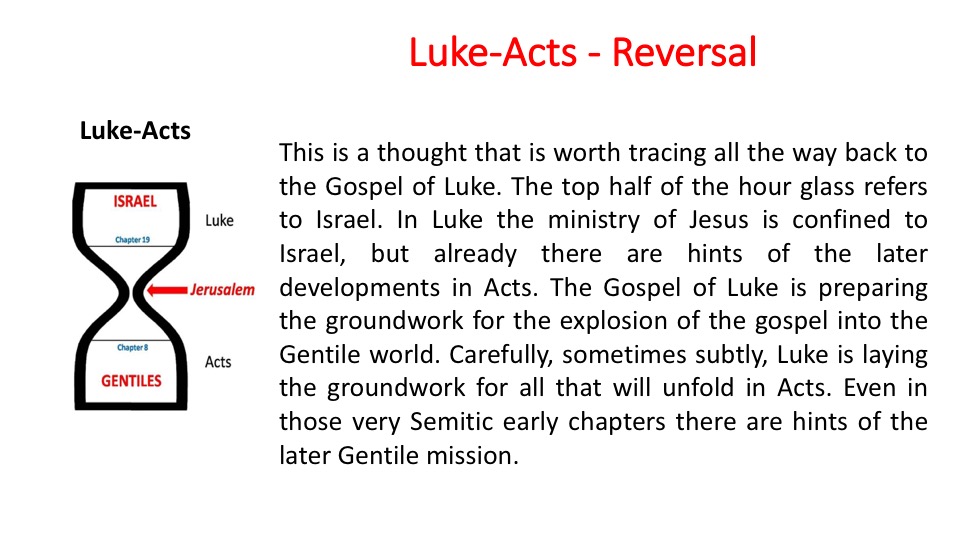
Luke-Acts and Geography-Reversal
This is a thought that is worth tracing all the way back to the Gospel of Luke. The top half of the hour glass refers to Israel. In Luke the ministry of Jesus is confined to Israel, but already there are hints of the later developments in Acts. The Gospel of Luke is preparing the ground for the explosion of the gospel into the Gentile world. Carefully, sometimes subtly, Luke is laying the groundwork for all that will unfold in Acts. Even in those very Semitic early chapters there are hints of the later Gentile mission.
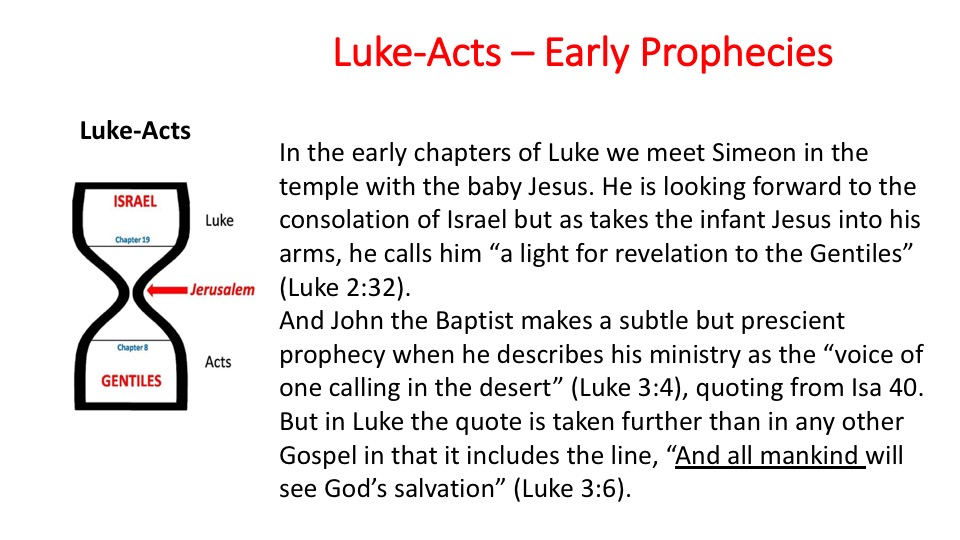
Luke-Acts – Early Prophecies
In the early chapters of Luke we meet Simeon in the temple with the baby Jesus. He is looking forward to the consolation of Israel but as takes the infant Jesus into his arms, he calls him “a light for revelation to the Gentiles” (Luke 2:32).
And John the Baptist makes a subtle but prescient prophecy when he describes his ministry as the “voice of one calling in the desert” (Luke 3:4), quoting from Isa 40. But in Luke the quote is taken further than in any other Gospel in that it includes the line, “And all mankind will see God’s salvation” (Luke 3:6).
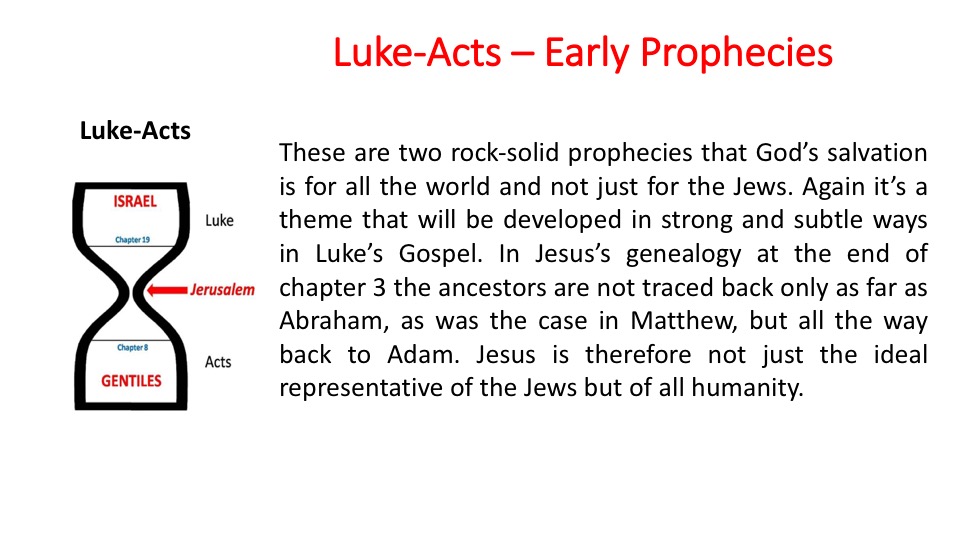
Luke-Acts – Early Prophecies
These are two rock-solid prophecies that God’s salvation is for all the world and not just for the Jews. Again it’s a theme that will be developed in strong and subtle ways in Luke’s Gospel. In Jesus’s genealogy at the end of chapter 3 the ancestors are not traced back only as far as Abraham, as was the case in Matthew, but all the way back to Adam. Jesus is therefore not just the ideal representative of the Jews but of all humanity.
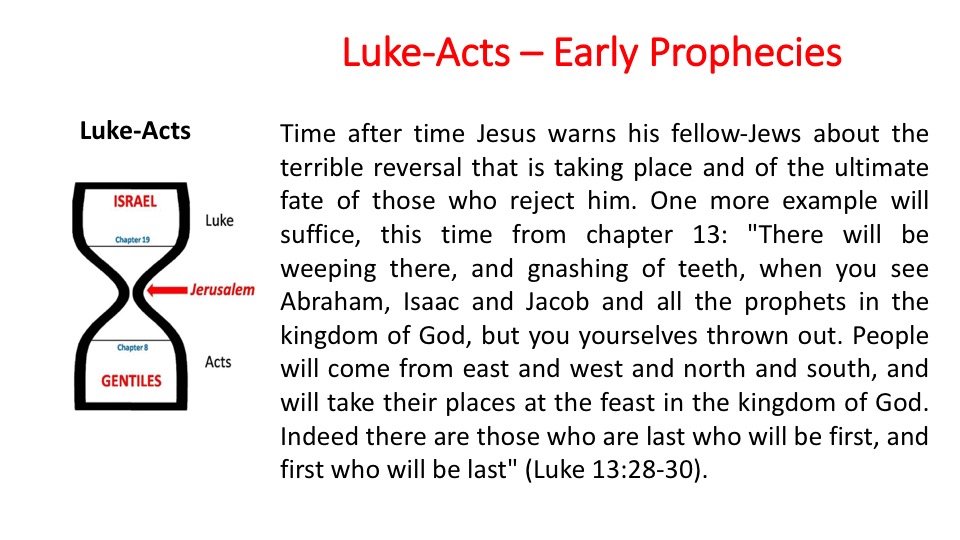
Luke-Acts – Early Prophecies
Time after time Jesus warns his fellow-Jews about the terrible reversal that is taking place and of the ultimate fate of those who reject him. One more example will suffice, this time from chapter 13: "There will be weeping there, and gnashing of teeth, when you see Abraham, Isaac and Jacob and all the prophets in the kingdom of God, but you yourselves thrown out. People will come from east and west and north and south, and will take their places at the feast in the kingdom of God. Indeed there are those who are last who will be first, and first who will be last" (Luke 13:28-30).
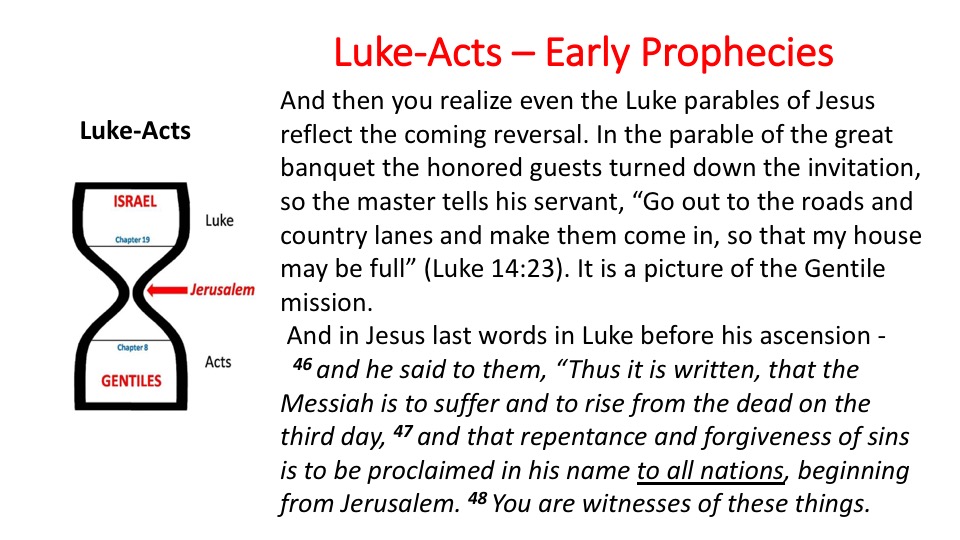
Luke-Acts – Early Prophecies
And then you realize even the Luke parables of Jesus reflect the coming reversal. In the parable of the great banquet the honored guests turned down the invitation, so the master tells his servant, “Go out to the roads and country lanes and make them come in, so that my house may be full” (Luke 14:23). It is a picture of the Gentile mission.
And in Jesus last word in Luke before his ascension - 46 and he said to them, “Thus it is written, that the Messiah is to suffer and to rise from the dead on the third day, 47 and that repentance and forgiveness of sins is to be proclaimed in his name to all nations, beginning from Jerusalem. 48 You are witnesses of these things.
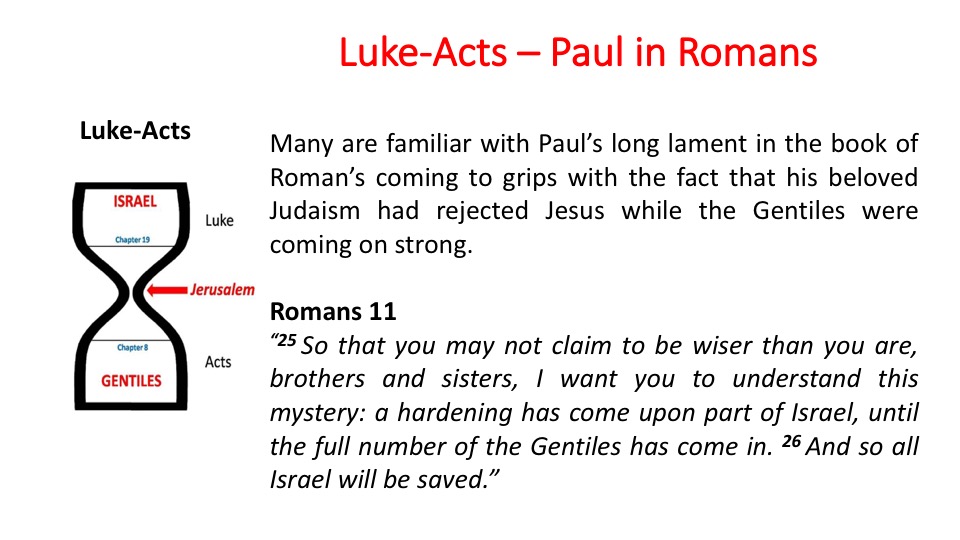
Luke-Acts – Paul in Romans
Many are familiar with Paul’s long lament in the book of Roman’s coming to grips with the fact that his beloved Judaism had rejected Jesus while the Gentiles were coming on strong.
Romans 11
25 So that you may not claim to be wiser than you are, brothers and sisters, I want you to understand this mystery: a hardening has come upon part of Israel, until the full number of the Gentiles has come in. 26 And so all Israel will be saved.
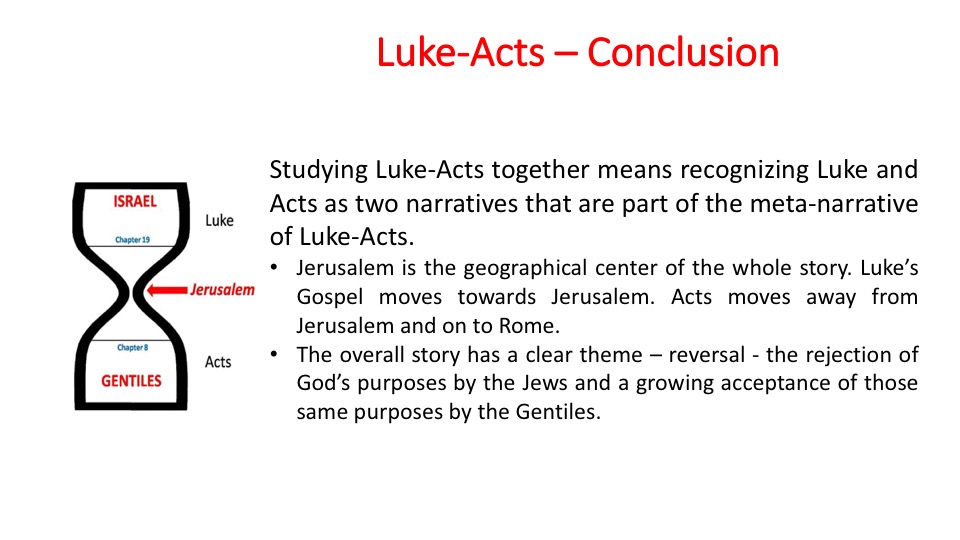
Luke-Acts – Conclusion
Studying Luke-Acts together means recognizing Luke and Acts as two narratives that are part of the meta-narrative of Luke-Acts.
Jerusalem is the geographical center of the whole story. Luke’s Gospel moves towards Jerusalem. Acts moves away from Jerusalem and on to Rome.
The overall story has a clear theme – the rejection of God’s purposes by the Jews and a growing acceptance of those same purposes by the Gentiles.
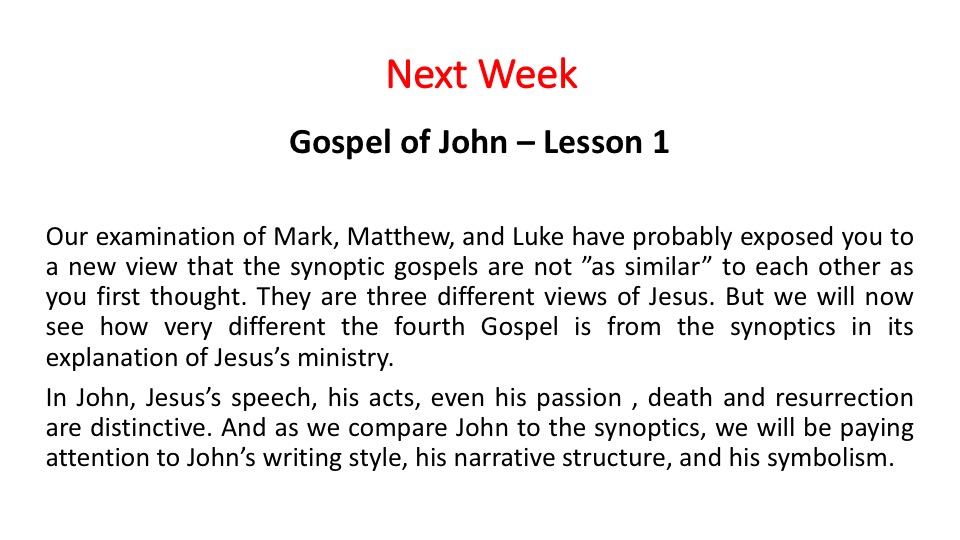
Next Week
Gospel of John
Our examination of Mark, Matthew, and Luke have probably exposed you to a new view that the synoptic gospels are not ”as similar” to each other as you first thought. They are three different views of Jesus. But we will now see how very different the fourth Gospel is from the synoptics in its explanation of Jesus’s ministry.
In John, Jesus’s speech, his acts, even his passion , death and resurrection are distinctive. And as we compare John to the synoptics, we will be paying attention to John’s writing style, his narrative structure, and his symbolism.